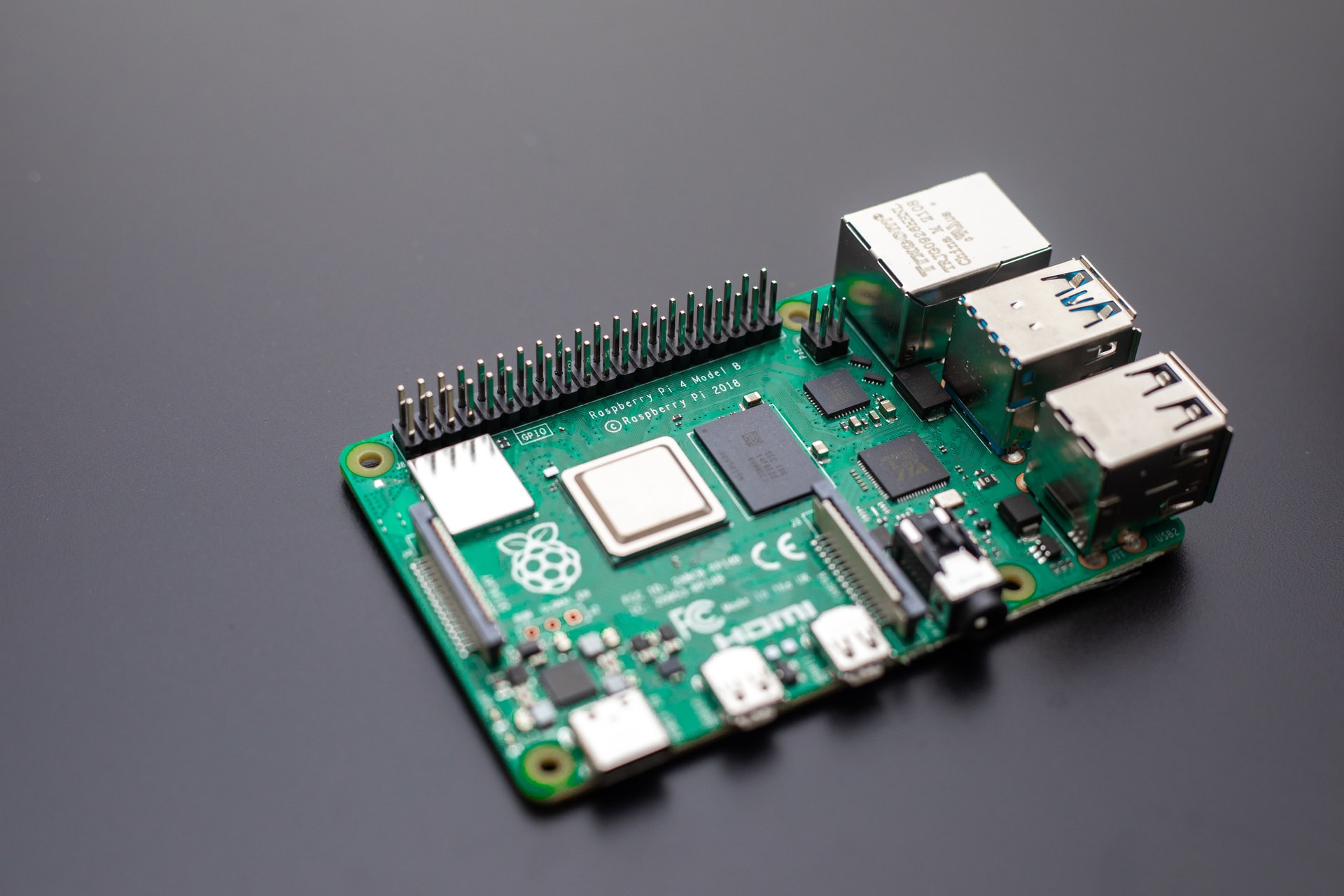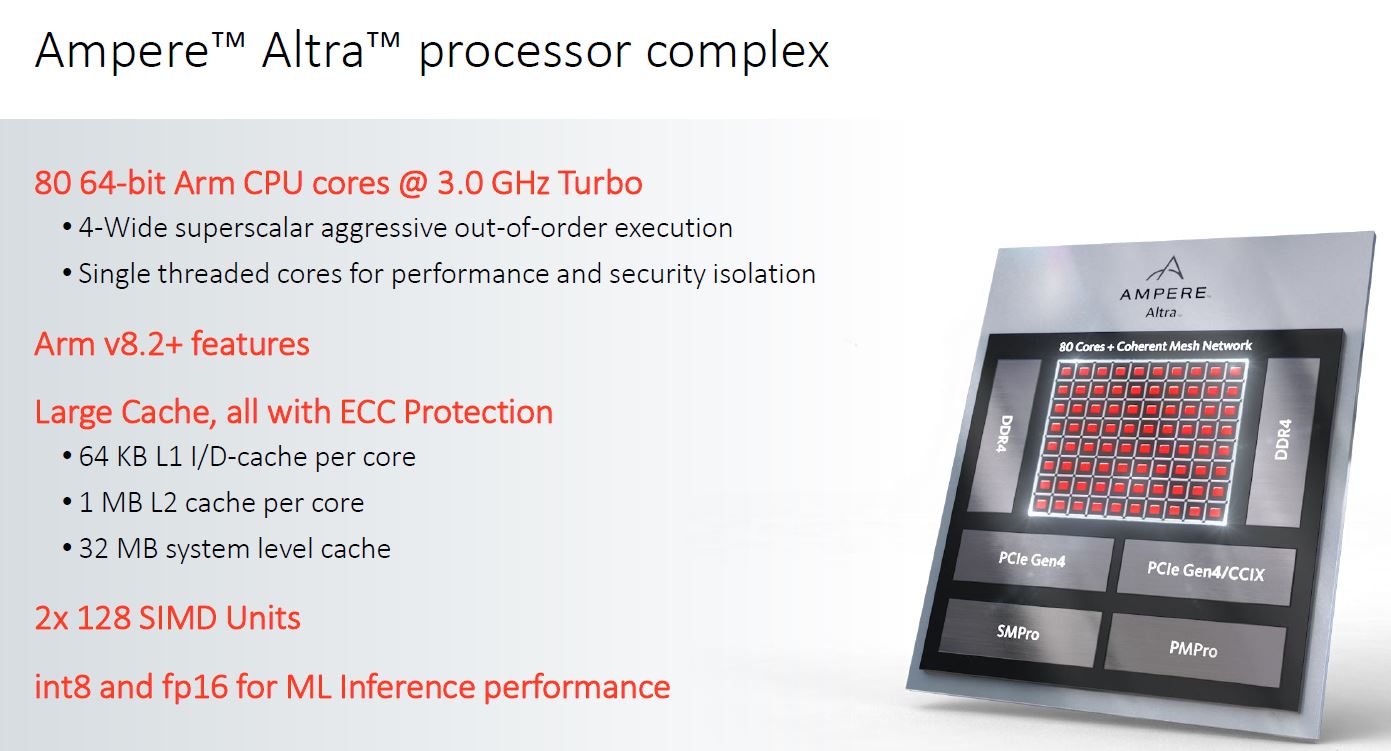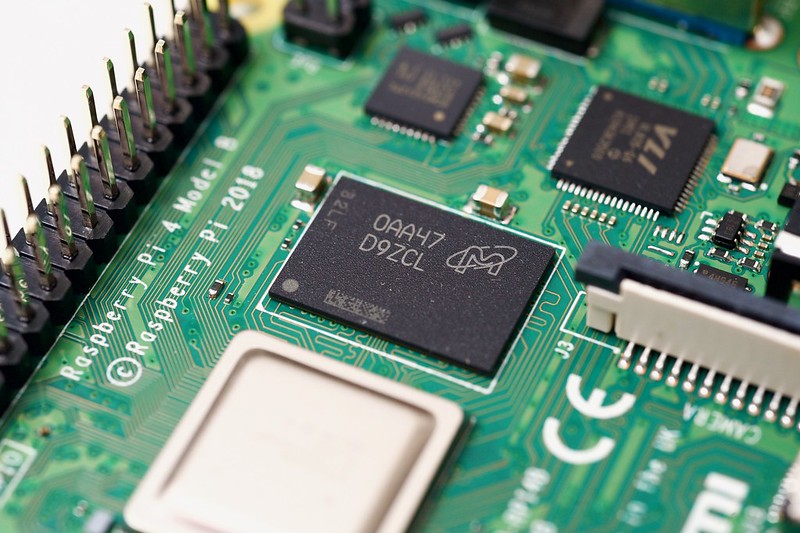Ampere Altra vs Raspberry Pi 4

In early 2020, recent semiconductor startup Ampere announced the Altra, an ultra-dense 80-core ARM64 CPU targeted at cloud computing environments. Patrick Kennedy of ServeTheHome covered the release with an excellent in-depth article last year which I highly recommend reading.
In mid-2020, Oracle became the first cloud provider to add the Ampere Altra to their cloud computing lineup. And in early 2021, Oracle took the unusual step of adding the Altra A1 VMs to their “Always Free” tier, allowing anyone to create ARM64 VMs with up to 4 cores and 24GB of RAM at no cost. I’ve recently started playing around more with my Oracle Cloud account, and decided to use Terraform to spin up a free ARM64 VM to compare its performance with one of my existing Raspberry Pi 4Bs.

Specifications#
Oracle allows “Always Free” tier users to create flexible instance sizes from a total resource pool of 4 “OCPUs” and an astonishing 24GB of RAM. To make the test as fair as possible, I created an instance with 4 OCPUs and 8GB of RAM to match the 8GB RPi 4 that I tested locally.
| System | VM.Standard.A1.Flex | Raspberry Pi 4B |
|---|---|---|
| CPU | 4x Ampere Altra A1 @ 3.0GHz | 4x ARM Cortex-A72 @ 1.5GHz |
| RAM | 8GB | 8GB |
| Storage | 50GB boot volume | 32GB microSD |
| OS | Ubuntu 20.04 ARM64 | Ubuntu 20.04 ARM64 |
Benchmark #1 - UnixBench#
UnixBench is, as the name implies, a benchmark for Unix systems using standard Unix operations. It’s intended to test multiple aspects of the system as a whole, both hardware and software, rather than focusing on any one particular component.
The standard testing methodology and aggregation of multiple aspects of system performance in a single score make it a very reliable method of judging system performance across platforms and CPU architectures.
Ampere Altra#
BYTE UNIX Benchmarks (Version 5.1.3)
System: **********: GNU/Linux
OS: GNU/Linux -- 5.11.0-1022-oracle -- #23~20.04.1-Ubuntu SMP Fri Nov 12 15:45:47 UTC 2021
Machine: aarch64 (aarch64)
Language: en_US.utf8 (charmap="UTF-8", collate="UTF-8")
18:42:15 up 2 min, 1 user, load average: 0.28, 0.27, 0.11; runlevel 2021-12-30
------------------------------------------------------------------------
Benchmark Run: Thu Dec 30 2021 18:42:15 - 19:10:10
4 CPUs in system; running 1 parallel copy of tests
Dhrystone 2 using register variables 41483611.9 lps (10.0 s, 7 samples)
Double-Precision Whetstone 8466.2 MWIPS (9.9 s, 7 samples)
Execl Throughput 5163.9 lps (30.0 s, 2 samples)
File Copy 1024 bufsize 2000 maxblocks 1077137.2 KBps (30.0 s, 2 samples)
File Copy 256 bufsize 500 maxblocks 300831.1 KBps (30.0 s, 2 samples)
File Copy 4096 bufsize 8000 maxblocks 3080256.7 KBps (30.0 s, 2 samples)
Pipe Throughput 1960270.1 lps (10.0 s, 7 samples)
Pipe-based Context Switching 87688.7 lps (10.0 s, 7 samples)
Process Creation 7644.5 lps (30.0 s, 2 samples)
Shell Scripts (1 concurrent) 10008.2 lpm (60.0 s, 2 samples)
Shell Scripts (8 concurrent) 3001.8 lpm (60.0 s, 2 samples)
System Call Overhead 1649115.6 lps (10.0 s, 7 samples)
System Benchmarks Index Values BASELINE RESULT INDEX
Dhrystone 2 using register variables 116700.0 41483611.9 3554.7
Double-Precision Whetstone 55.0 8466.2 1539.3
Execl Throughput 43.0 5163.9 1200.9
File Copy 1024 bufsize 2000 maxblocks 3960.0 1077137.2 2720.0
File Copy 256 bufsize 500 maxblocks 1655.0 300831.1 1817.7
File Copy 4096 bufsize 8000 maxblocks 5800.0 3080256.7 5310.8
Pipe Throughput 12440.0 1960270.1 1575.8
Pipe-based Context Switching 4000.0 87688.7 219.2
Process Creation 126.0 7644.5 606.7
Shell Scripts (1 concurrent) 42.4 10008.2 2360.4
Shell Scripts (8 concurrent) 6.0 3001.8 5003.1
System Call Overhead 15000.0 1649115.6 1099.4
========
System Benchmarks Index Score 1669.7
------------------------------------------------------------------------
Benchmark Run: Thu Dec 30 2021 19:10:10 - 19:38:05
4 CPUs in system; running 4 parallel copies of tests
Dhrystone 2 using register variables 165260124.9 lps (10.0 s, 7 samples)
Double-Precision Whetstone 33900.5 MWIPS (9.9 s, 7 samples)
Execl Throughput 12794.4 lps (30.0 s, 2 samples)
File Copy 1024 bufsize 2000 maxblocks 776156.4 KBps (30.0 s, 2 samples)
File Copy 256 bufsize 500 maxblocks 214667.2 KBps (30.0 s, 2 samples)
File Copy 4096 bufsize 8000 maxblocks 2345518.7 KBps (30.0 s, 2 samples)
Pipe Throughput 7825529.6 lps (10.0 s, 7 samples)
Pipe-based Context Switching 867609.5 lps (10.0 s, 7 samples)
Process Creation 20049.6 lps (30.0 s, 2 samples)
Shell Scripts (1 concurrent) 24471.2 lpm (60.0 s, 2 samples)
Shell Scripts (8 concurrent) 3410.3 lpm (60.0 s, 2 samples)
System Call Overhead 4281214.8 lps (10.0 s, 7 samples)
System Benchmarks Index Values BASELINE RESULT INDEX
Dhrystone 2 using register variables 116700.0 165260124.9 14161.1
Double-Precision Whetstone 55.0 33900.5 6163.7
Execl Throughput 43.0 12794.4 2975.5
File Copy 1024 bufsize 2000 maxblocks 3960.0 776156.4 1960.0
File Copy 256 bufsize 500 maxblocks 1655.0 214667.2 1297.1
File Copy 4096 bufsize 8000 maxblocks 5800.0 2345518.7 4044.0
Pipe Throughput 12440.0 7825529.6 6290.6
Pipe-based Context Switching 4000.0 867609.5 2169.0
Process Creation 126.0 20049.6 1591.2
Shell Scripts (1 concurrent) 42.4 24471.2 5771.5
Shell Scripts (8 concurrent) 6.0 3410.3 5683.8
System Call Overhead 15000.0 4281214.8 2854.1
========
System Benchmarks Index Score 3641.0
Raspberry Pi 4#
BYTE UNIX Benchmarks (Version 5.1.3)
System: **********: GNU/Linux
OS: GNU/Linux -- 5.4.0-1047-raspi -- #52-Ubuntu SMP PREEMPT Wed Nov 24 08:16:38 UTC 2021
Machine: aarch64 (aarch64)
Language: en_US.utf8 (charmap="UTF-8", collate="UTF-8")
11:40:13 up 3 days, 1:39, 1 user, load average: 1.57, 0.89, 0.74; runlevel 2021-09-07
------------------------------------------------------------------------
Benchmark Run: Thu Dec 30 2021 15:42:07 - 16:10:28
4 CPUs in system; running 1 parallel copy of tests
Dhrystone 2 using register variables 15090554.5 lps (10.0 s, 7 samples)
Double-Precision Whetstone 2682.9 MWIPS (9.9 s, 7 samples)
Execl Throughput 570.5 lps (30.0 s, 2 samples)
File Copy 1024 bufsize 2000 maxblocks 92917.6 KBps (30.0 s, 2 samples)
File Copy 256 bufsize 500 maxblocks 25770.6 KBps (30.0 s, 2 samples)
File Copy 4096 bufsize 8000 maxblocks 273542.6 KBps (30.0 s, 2 samples)
Pipe Throughput 141626.1 lps (10.0 s, 7 samples)
Pipe-based Context Switching 29427.5 lps (10.0 s, 7 samples)
Process Creation 2160.1 lps (30.0 s, 2 samples)
Shell Scripts (1 concurrent) 1980.0 lpm (60.0 s, 2 samples)
Shell Scripts (8 concurrent) 670.6 lpm (60.0 s, 2 samples)
System Call Overhead 170070.1 lps (10.0 s, 7 samples)
System Benchmarks Index Values BASELINE RESULT INDEX
Dhrystone 2 using register variables 116700.0 15090554.5 1293.1
Double-Precision Whetstone 55.0 2682.9 487.8
Execl Throughput 43.0 570.5 132.7
File Copy 1024 bufsize 2000 maxblocks 3960.0 92917.6 234.6
File Copy 256 bufsize 500 maxblocks 1655.0 25770.6 155.7
File Copy 4096 bufsize 8000 maxblocks 5800.0 273542.6 471.6
Pipe Throughput 12440.0 141626.1 113.8
Pipe-based Context Switching 4000.0 29427.5 73.6
Process Creation 126.0 2160.1 171.4
Shell Scripts (1 concurrent) 42.4 1980.0 467.0
Shell Scripts (8 concurrent) 6.0 670.6 1117.6
System Call Overhead 15000.0 170070.1 113.4
========
System Benchmarks Index Score 265.5
------------------------------------------------------------------------
Benchmark Run: Thu Dec 30 2021 16:10:28 - 16:38:54
4 CPUs in system; running 4 parallel copies of tests
Dhrystone 2 using register variables 60067639.9 lps (10.0 s, 7 samples)
Double-Precision Whetstone 10702.3 MWIPS (9.8 s, 7 samples)
Execl Throughput 1995.7 lps (29.9 s, 2 samples)
File Copy 1024 bufsize 2000 maxblocks 181967.0 KBps (30.0 s, 2 samples)
File Copy 256 bufsize 500 maxblocks 48675.5 KBps (30.0 s, 2 samples)
File Copy 4096 bufsize 8000 maxblocks 455783.0 KBps (30.0 s, 2 samples)
Pipe Throughput 559095.7 lps (10.0 s, 7 samples)
Pipe-based Context Switching 127558.3 lps (10.0 s, 7 samples)
Process Creation 5773.4 lps (30.0 s, 2 samples)
Shell Scripts (1 concurrent) 5510.9 lpm (60.0 s, 2 samples)
Shell Scripts (8 concurrent) 746.7 lpm (60.2 s, 2 samples)
System Call Overhead 662741.3 lps (10.0 s, 7 samples)
System Benchmarks Index Values BASELINE RESULT INDEX
Dhrystone 2 using register variables 116700.0 60067639.9 5147.2
Double-Precision Whetstone 55.0 10702.3 1945.9
Execl Throughput 43.0 1995.7 464.1
File Copy 1024 bufsize 2000 maxblocks 3960.0 181967.0 459.5
File Copy 256 bufsize 500 maxblocks 1655.0 48675.5 294.1
File Copy 4096 bufsize 8000 maxblocks 5800.0 455783.0 785.8
Pipe Throughput 12440.0 559095.7 449.4
Pipe-based Context Switching 4000.0 127558.3 318.9
Process Creation 126.0 5773.4 458.2
Shell Scripts (1 concurrent) 42.4 5510.9 1299.7
Shell Scripts (8 concurrent) 6.0 746.7 1244.5
System Call Overhead 15000.0 662741.3 441.8
========
System Benchmarks Index Score 730.7
Benchmark #2 - Sysbench#
Sysbench is an open-source benchmarking tool that features several independent tests of system hardware performance. The tests I’ll focus on are CPU, memory, and file I/O.
Each test was run on a clean system with no other competing workloads.
| Category | Metric | Ampere Altra A1 | Raspberry Pi 4B |
|---|---|---|---|
| CPU | primes/sec | 3511.65 | 1486.26 |
| RAM | throughput, MiB/s | 4643.80 | 2016.59 |
| File I/O | sequential write, MiB/s | 55.81 | 13.02 |
| File I/O | sequential write, iops | 3551.19 | 797.32 |
| File I/O | random write, MiB/s | 33.17 | 4.59 |
| File I/O | random write, iops | 2122.76 | 293.73 |
Interpreting the Results#
Straight away, it’s clear that there is a significant performance difference between the admittedly aging ARM Cortex-A72 and the Altra.
On CPU performance, adjusting for the clock speed difference between the Altra and the Cortex-A72 yields an 18% improvement in IPC. Considering the 4 year age difference between the two chips, it’s not earth-shattering - x86 platforms have shown similar trends over the years - but it’s still respectable and shows that Ampere has the engineering talent to keep pace with the likes of Intel and AMD.
Since UnixBench is intended to be a general system benchmark and not purely a measure of CPU muscle, I was most interested to see what else contributed to the whopping 5x increase in the UnixBench index score. For that, I believe the Sysbench memory test points us in the right direction.
The Sysbench RAM result shows an incredible 130% increase in memory throughput on the A1. This result is surprising on its surface - after all, both the Altra and the Cortex-A72 use DDR4 RAM, right? Not quite.
As a small, low-power/embedded style device, the Raspberry Pi 4 carries the burden of an insanely low power budget - less than 10W. Cutting consumption on the CPU alone isn’t enough to meet those demands, however, so the Pi 4 uses a low-power variant of DDR4 called LPDDR4, intended primarily for mobile platforms.
As discussed in this DDR4 explainer from HardwareTimes, LPDDR4 makes several key trade-offs for power consumption that result in greatly decreased memory bandwidth. While the Pi 4’s DRAM operates at the same 3200MT/s rate as the Altra, its performance is ultimately kneecapped by a single-channel memory implementation and LPDDR4’s greatly reduced 32-bit bus width.

Photo by Jeff Geerling, licensed under CC BY 2.0
Other factors like File I/O do show significant improvements from the Pi 4, but that seems to be due solely to the Pi 4’s microSD card rather than some exceptional storage technology within the Oracle Cloud. Keep in mind that 55MiB/s and 2-3k IOPS is lacking compared to even the lowest consumer-grade SATA 6Gb/s SSDs. It is noteworthy nonetheless that Oracle is able to provide this level of performance in a free cloud server. I fully expect that the Pi 4 would win in this category with a USB3 flash drive or SSD.
All that being said, I went into this experiment fully expecting to see performance of the free Ampere VM roughly on-par with the Pi 4, at best. My suspicions were based on the anemic performance of other cloud providers’ free tier compute instances - AWS’s t2.micro, Azure’s B1s burstable, and even Oracle’s existing AMD Epyc “micro” shape. The Ampere VMs in Oracle’s free tier are surprisingly capable and unlike any other free offering I’ve seen to date.